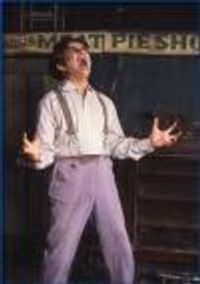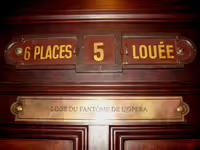Somewhat Baffling High Note Trends
BeingAlive44Ever
Featured Actor Joined: 5/26/23
#1Somewhat Baffling High Note Trends
Posted: 5/1/24 at 9:24am
I was thinking about this earlier today. In early musical theatre, you hear a lot of high notes because amplification was worse or in some cases not an option. You'd hear big, vibrato filled, very forward high notes-- in some stuff, like Carousel or Porgy and Bess, the bass-baritone lead will have to consistently use high F's and G's to project properly over the orchestra. This all originates from the operatic tradition, of course. There's a reason lighter voices, as a rule, sing higher in opera. It's so they can be heard. While I would never claim classical music isn't dynamic, the context in which it is performed demands relatively constant fullness, which is often easier to attain when singing at the upper end of the range, which is why really great basses are incredibly rare and sought after.
All this is really to ask-- why is musical theatre getting high again? In the seventies through the nineties you'd have some super high stuff, sure, like Jesus Christ Superstar or Evita or every other Andrew Lloyd Webber show because his compositions are borderline psychotic. But people like Sondheim would write high notes in moderation. Often side characters who only had one or two songs would be given operatic high notes (think Beadle Bamford or Pirelli in Sweeney Todd), but you didn't really have central characters constantly belting their heads off. Even his tenor roles, like George in Sunday, despite lying high, never really went to nearly the crazy pitches that modern musicals' leads do. And it wasn't just him. Even stuff like Rent doesn't have its lead guys going much higher than a few A4's, and really only a few. And this makes sense. In an opera, you can have your characters singing high B's and C's because they don't have to do eight shows a week. It's the norm for tenors to stay up there and just sing high notes over and over, and sopranos as well, although usually not at the very top of their range. In modern musical theatre, it's more like every single role just has to sing so high. I can't identify a starting point, but off the top of my head...
Elphaba has multiple high F's and often has to sing D#5's over and over for extended passages, which is just ridiculous for a mezzo soprano, and especially a belty role to do eight times a week
Glinda has a soprano C, several high A's, and has to belt a bit as well. Kristin Chenoweth can do it but a lot of Glindas I've seen struggle-- again, eight shows a week of that kind of material is absurd.
Dewey in School of Rock has been discussed on this forum before-- constant high A's and B's and a few D's as well, just not sustainable. Andrew Lloyd Webber is a psycho.
Evan in Dear Evan Hansen has constant belted high A's and sometimes higher notes, with a handful of A#'s and one high B. This is especially crazy because he also regularly sings at the very bottom of the bass clef, with low A#'s and G's all the time. I do not understand how anybody thought this was a role that a twenty year old could play.
Usher in A Strange Loop just constantly belting crazy high for no reason in a show that is mostly him
Does anybody know why this is a trend? Like, with amplification how it is now and everything, you'd think that the theatre would come back down in terms of pitch, which it did for a bit, but now it's suddenly so high again in the last twenty or so years. Why could this be?
#2Somewhat Baffling High Note Trends
Posted: 5/1/24 at 9:47am
Think it started with the 80s mega musicals and then got cemented with the popularity of Wicked. Now it's expected. It really is not sustainable, but musical theater is just turning so homogenous and now I go into a new musical expecting actors to be belting out crazy notes. There was a trend for awhile too of a lot of actors riffing for no reason. I think that's died down a little, thankfully.
jasmiinda
Swing Joined: 7/20/23
#3Somewhat Baffling High Note Trends
Posted: 5/1/24 at 9:49am
Super uneducated about theatre and music theory, but when you lay out the history like that, it makes it sound like a reversal or trends. The mid-to-late 20th century was full ove relatively lower register singing so when people in the late-20th to early-21st centuries started using higher notes it felt kind of surprising and fresh and became the new trend? But everything has to top the last thing so the notes get higher and higher and are more common in each show. Just some conjecture.
BeingAlive44Ever
Featured Actor Joined: 5/26/23
#4Somewhat Baffling High Note Trends
Posted: 5/1/24 at 10:31am
Quote RiddepMan: "There was a trend for awhile too of a lot of actors riffing for no reason. I think that's died down a little, thankfully."
I forgot all about that. It really is so strange. I love Lillias White, but in How to Succeed she was just so strange for this very reason. And that was before Wicked and all that. I think that Wicked may well have been the big turning point. I feel like megamusicals aren't very successful anymore, though. Like, the most successful shows on Broadway recently are mostly either movie adaptations (Back to the Future), musicals with very digestible music (Hamilton, which actually has another huge singing problem that I'll likely make a thread about in the future if another musical does the same thing all of Lin's shows do), or just actually genuinely incredible pieces (Hadestown comes to mind. Probably the best musical of the whole 21st century so far. It's not exempt from this strange trend of high notes, of course, but somehow I'm more willing to forgive it because it rarely feels like it's high for no reason.)
Quote jasmiinda: "The mid-to-late 20th century was full ove relatively lower register singing so when people in the late-20th to early-21st centuries started using higher notes it felt kind of surprising and fresh and became the new trend?"
I can see this perspective too. It feels a little strange, though, just because high notes were borderline necessary in early musical theatre and have actually become more prolific now that they're unnecessary. That being said, in early musical theatre, you would have, as you said, singers in a lower register. Even though they did sing quite high to project over an orchestra, it was very much rooted in a slightly more forward operatic style of singing. Now the voices are, as a rule, lighter. The distinction between high notes and normal notes is firmly made by belting. I think that it's completely possible and even probable that the trend of using higher notes actually comes from a place of wanting to use higher registers, since audiences now don't immediately recognize how impressive, for example, a baritone F is. But it's easy to hear somebody clearly yelling at the top of their range and be impressed. I hadn't considered this angle, but it's actually very valuable to hear from somebody who isn't well versed in music on this particular topic. Thank you!
#5Somewhat Baffling High Note Trends
Posted: 5/1/24 at 10:39amHow do you have this conversation without mentioning Jekyll & Hyde?
BeingAlive44Ever
Featured Actor Joined: 5/26/23
#6Somewhat Baffling High Note Trends
Posted: 5/1/24 at 10:49am
CATSNYrevival said: "How do you have this conversation without mentioning Jekyll & Hyde?"
There's a lot to mention about Jekyll and Hyde. I think that the difficulty of the lead role comes more from having like eight solos than anything else. When you actually look at it, Jekyll stays within the conventional dramatic tenor register, but with more material than you'd usually see in an opera, plus the necessary shifts in color to portray Hyde. In high school, I won a competition with Confrontation from that show, and I didn't understand what was so impressive about it. Now I get it, of course. I actually think that, although this show has its own problems, it's exempt from this trend... For the male lead, that is. The female leads exemplify this problem incredibly well. I'm drawing a blank on their names and the notes they sing because I'm mostly familiar with Jekyll's songs, but I remember excessive high notes for sure in their songs. I apologize for neglecting this show entirely in my long winded rant. I didn't mention several others that I thought were much more egregious, though. Bat Boy, Heathers, and Legally Blonde all come to mind. Laurence O'Keiff is a psycho.
#7Somewhat Baffling High Note Trends
Posted: 5/1/24 at 12:07pm
As a bass-baritone, I would argue that for men, Sondheim was the last major composer to really write for baritones. I think part of this was because he very lyric/character-driven, with many of his principal male characters not even requiring a singer with a "great" voice, but an actor who happens to sing well and knows how to interpret a song. Most men are baritones, and require training to sing higher than a D or E. Not all Sondheim roles (male or female) require highly trained voices since lyric, character, and an overall musicality was more important to him than the common perception that "high = more emotional and therefore better."
That said, musical theatre has always reflected pop music of the time to a certain degree, and nowadays, most pop music is pretty high.
BeingAlive44Ever
Featured Actor Joined: 5/26/23
#8Somewhat Baffling High Note Trends
Posted: 5/1/24 at 12:39pm
The Distinctive Baritone said: "As a bass-baritone, I would argue that for men, Sondheim was the last major composer to really write for baritones. I think part of this was because he very lyric/character-driven, with many of his principal male characters not even requiring asinger with a "great" voice, but an actor who happens to sing well and knows how to interpret a song. Most men are baritones, and require training to sing higher than a D or E. Not all Sondheim roles (male or female) require highly trained voices since lyric, character, and an overall musicality was more important to him than the common perception that "high = more emotional and therefore better."
That said, musical theatre has always reflected pop music of the time to a certain degree, and nowadays, most pop music is pretty high."
I really appreciate your agreeing with my point about Sondheim not writing super high. His songs are demanding, but they're made with human limits in mind. They're a challenge and a puzzle to figure out, but they aren't punishing and horrible like Andrew Lloyd Webber or Laurence O'Keiff. I will say, Bill Finn has written a good number of roles that are great for baritones, including all three leading men in Falsettos (although none of them are bass-baritones)
Sondheim certainly wrote for the actors he had. All great composers do. Chip Zien can't comfortably sing above a G and his best sounding place is around a D4. Some composers would throw him out for somebody with a higher voice. Sondheim wrote specifically for him and made a score that sounds rich and beautiful in his voice and is actually a bit hard for anybody else to sing as well as Chip.
I could agree that it is largely reflective of modern pop music. But I don't think that's exactly it. There aren't really whistle tones in musical theatre, there's a lot of belting that isn't really present in pop music, there's a lot less falsetto than in pop music. I think that there's a trend in the theatre itself. Probably due to successful shows by ALW and Stephen Schwartz.
#9Somewhat Baffling High Note Trends
Posted: 5/1/24 at 12:47pm
I'm not sure how often Sondheim wrote for specific actors. I remember reading that he wrote the title role in Sweeney Todd with Len Cariou in mind after working with him on A Little Night Music, but I would be interested to find out how much his original actors' vocal ranges affected his writing. I believe that most famously, "Send in the Clowns" was written after Glynis Johns had been cast and was already in rehearsals and/or workshops, and tailored to her low, raspy voice. However, I imagine that workshops and out of town tryouts aside, he mostly wrote most of the songs to his shows prior to casting, and worked in collaboration with the director et al to find actors best suited for his songs, rather than the other way around.
Updated On: 5/1/24 at 12:47 PM
BeingAlive44Ever
Featured Actor Joined: 5/26/23
#10Somewhat Baffling High Note Trends
Posted: 5/1/24 at 12:54pm
The Distinctive Baritone said: "I'm not sure how often Sondheim wrote forspecificactors. I remember reading that he wrote the title role in Sweeney Todd with Len Cariou in mind after working with him onA Little Night Music,but I would be interested to find out how much his original actors' vocal ranges affected his writing. I believe that most famously, "Send in the Clowns" was written after Glynis Johns had been cast and was already in rehearsals and/or workshops, and tailored to her low, raspy voice."
He's actually jokingly quipped "I won't write a note until the show's cast." Some is conjecture, like I personally love to think that Jack in Into the Woods was written for John Cameron Mitchell based off of one single bonus track on the Into the Woods album, despite there being no documented evidence of him even being in any workshops of the show. It is known, though, that Sunday was written very specifically for Mandy and Bernadette (two great voices that tend lower, which is ironic because they're a tenor and a soprano)
I think that he often would just write for whatever actors he had cast. Maybe not always, but in shows that developed during their runs like Sunday, Into the Woods, etc he has stated that he wrote it with specific people in mind. And it's known that he wrote Beadle Bamford specifically for Jack Eric Williams, which is why every single professional version of Kiss Me Quartet other than the original sounds empty.
He explained this with a piece of wisdom that kind of circles back around to the main topic:
When something is very deeply personal, it will become universal. That's something so brilliant and so true that really changes how I think about theatre and art and life in general.
...
So, tell me, why would you make it the opposite of personal by writing something that nobody can sing just to appeal to the masses?
But I'm preaching to the choir, I don't think any huge fan of theatre exactly "likes" that a lot of shows tend to equate high belting to emotions
#11Somewhat Baffling High Note Trends
Posted: 5/1/24 at 1:39pm
Honestly, I think it's as simple as the fact that vocal pyrotechnics are a cheap way to thrill the audience. Everyone gets excited when the lead unhinges her jaw and belts like a tornado siren, and then they go and tell their friends about it, or they post an audio clip on tiktok, which makes the rounds as free advertising. Mozart's (arguably) most famous aria is based entirely around exploiting his sister-in-law's absurd upper register and people still buy tickets for The Magic Flute specifically to hear those high notes.
#12Somewhat Baffling High Note Trends
Posted: 5/1/24 at 2:12pm
It's worth mentioning along with the "Send in the Clowns" story: arguably the greatest and most popular male singer of the twentieth century, Frank Sinatra, had a rather small, weak voice and a limited range, once he lost his boyish falsetto. He didn't have much of an instrument, technically speaking, but you'll never hear anyone say Sinatra was a **** singer, because he knew how to use what he had, and how to interpret a song to suit his own vocal stylings better than anyone else. You can call him a cliche, but you can't call him generic. He did more with his two or so octaves than a lot of Big Voices do with their four.
BeingAlive44Ever
Featured Actor Joined: 5/26/23
#13Somewhat Baffling High Note Trends
Posted: 5/1/24 at 3:04pm
darquegk said: "It's worth mentioning along with the "Send in the Clowns" story: arguably the greatest and most popular male singer of the twentieth century, Frank Sinatra, had a rather small, weak voice and a limited range, once he lost his boyish falsetto. He didn't have much of an instrument, technically speaking, but you'll never hear anyone say Sinatra was a **** singer, because he knew how to use what he had, and how to interpret a song to suit his own vocal stylings better than anyone else. You can call him a cliche, but you can't call him generic. He did more with his two or so octaves than a lot of Big Voices do with their four."
I think that's a good observation, although I'd debate "limited." He had at least three octaves, including an incredible full voice register stretching all the way from a low C to a high A#. That's actually a rather wide range. It may not be four octaves, but I'd argue most big voices don't even have that. Plus, the style he sings in meant he didn't push his voice to its upward extreme the way rock and Broadway singers do. Frank Sinatra had an incredible voice and I admire him greatly.
Now here's a man with a relatively small vocal range who has made the most of it and is actually a huge Broadway star:
John Cameron Mitchell. He is essentially restricted to somewhere around a low E or F (though usually no lower than an A) to a high G#. Usually he doesn't sing higher than an F#, maybe a few G's per show (plus a G# in Giants in the Sky and a few A's in some of his songs that he wrote). But his incredible tone with his very fast and powerful vibrato and incredibly open throated sound made his voice more than enough to leave his mark as a Broadway legend. I've heard some people say he has the weakest voice out of all the Broadway Hedwigs (other than Taye Diggs). That is just wrong if you ask me. I agree that range does not equate to vocal capabilities.
chrishuyen
Broadway Legend Joined: 11/12/14
#14Somewhat Baffling High Note Trends
Posted: 5/1/24 at 4:02pm
I'm not a singer or trained vocalist so apologies for anything I might've gotten wrong, but a lot of this comes from anecdotal experience as well as other threads that might've mentioned part of this before.
For things like opera where the singers are unamplified, I believe the high notes are written with vocal pedagogy in mind so that they will resound the most and be able to carry, but I think a lot of musical theater performers early in their careers may not be trained in the same way (maybe it's different now that a lot of singing teachers get a low level of Youtube/Tiktok fame, but Ramin Karimloo comes to mind), and I think they push themselves to go higher to sound more "impressive" which is probably also perpetuated by other people singing high notes--I think the trend of "American Idol-ification" has been noted in other places, where the voices that get attention are the voices that have the most range.
I think the idea of paying attention to the actual timbre of a voice has sort of been lost with a few exceptions, and from what I understand, some drama schools like AMDA sound like they develop their students in a way to make them the most "castable" and thus lose out on some of the individuality in each performer (so the main way they express how good they are is usually through their high range and sometimes melisma). It's been noted elsewhere on this board but we don't really seem to have an up and coming generation of "old broad voices" like Ethel Merman/Angela Lansbury/Patti LuPone, because everyone sounds more or less the same--somewhat Disney princess or just a generic pop belt.
So in short, I think the high notes are coming back because it's just what's deemed "most impressive" right now and kind of guaranteed to generate an audience response. It's funny because I was just having a conversation about how a lot of people don't like Billie Eilish or think she can't sing because she does a lot of whisper-singing but it actually shows off how impressive her vocal control is.
SporkGoddess
Broadway Legend Joined: 7/27/05
#15Somewhat Baffling High Note Trends
Posted: 5/1/24 at 4:05pm
For women at least, I wouldn't even say that it's so much high notes as BELTING high notes, or a mixture of belting with high "legit" soprano notes. Or the high notes are sustained in a way that makes them very difficult to sing consistently (the famous example being Christine's cadenza in Phantom of the Opera).
BeingAlive44Ever
Featured Actor Joined: 5/26/23
#16Somewhat Baffling High Note Trends
Posted: 5/1/24 at 4:22pm
SporkGoddess said: "For women at least, I wouldn't even say that it's so much high notesas BELTING high notes, or a mixture of belting with high "legit" soprano notes. Or the high notes are sustained in a way that makes them very difficult to sing consistently (the famous example being Christine's cadenza in Phantom of the Opera)."
That's very true. I think that there's a distinct difference between operatic and belted high notes in how they're written in music, in that an operatic high note is meant to be unforced and be a part of the melody and the line of the song, while a belted high note is designed to stick out and wow the less musically inclined audience members. It's just objectively healthier to sing in a classical style. But ALW had to ruin that too with Phantom... I will say, though, you'd be hard pressed to find a mezzo soprano piece that lies nearly as high as Defying Gravity in any opera. That's what I really mean by "high notes"-- repeated excessive high notes
Charley Kringas Inc said: "Honestly, I think it's as simple as the fact that vocal pyrotechnics are a cheap way to thrill the audience. Everyone gets excited when the lead unhinges her jaw and belts like a tornado siren, and then they go and tell their friends about it, or they post an audio clip on tiktok, which makes the rounds as free advertising. Mozart's (arguably) most famous aria is based entirely around exploiting his sister-in-law's absurd upper register and people still buy tickets for The Magic Flute specifically to hear those high notes"
This is an astute observation. It is true that certain operatic composers (namely Mozart and Rossini) liked to write excessively high and demanding vocal lines to impress people. That being said, a lot of opera people kind of resent Mozart's music for one reason or another, for me personally it's mostly just how he has such insistence on adhering to musical symmetry. His music is indeed more complex than what people were used to at the time, but people were starting to experiment with things like operetta and multiple movement arias and duets and quartets and all these things that, while fairly straightforward and digestible, wind up a lot more interesting down the line than Mozart's innovations that mostly fell flat for me. But never mind that. What I really mean to say is that, even for somebody like me who doesn't particularly like Mozart, I can admit that The Magic Flute is a whole heck of a lot more than the Queen of the Night singing a few high F's. That is indeed a very impressive aria, but there also is a very particularly impressive bass role in the piece. High notes in opera were often necessary and really a lot more feasible on account of the fact that they weren't performed multiple times per day and they were always performed by people who specifically were trained for that kind of singing.
SporkGoddess
Broadway Legend Joined: 7/27/05
#17Somewhat Baffling High Note Trends
Posted: 5/1/24 at 4:47pm
Yes, good point about "Defying Gravity." Opera also takes into account the weight of the singer's voice and works with it, so high notes that need to be sung as light and floaty can be sung that way, as opposed to musical theatre where mics allow audiences to hear high notes that aren't sung the way high notes are *supposed* to be sung in terms of vocal health and technique.
Like, "Glitter and be Gay" is brutal, but at least those high notes are light, flexible, and (for the most part) staccato. Mozart wrote a ridiculously high tessitura for Queen of the Night, but he didn't ask for her to sustain that F6, either.
Not to mention the range. Some of these modern female musical role ranges are just ridiculous.
BeingAlive44Ever
Featured Actor Joined: 5/26/23
#18Somewhat Baffling High Note Trends
Posted: 5/1/24 at 6:06pm
SporkGoddess said: "Yes, good point about "Defying Gravity." Opera also takes into account the weight of the singer's voice and works with it, so high notes that need to be sung aslight and floaty can be sung that way,as opposed to musical theatre where mics allow audiences to hearhigh notes that aren't sung the way high notes are *supposed* to be sung in terms of vocal health and technique.
Like, "Glitter and be Gay" is brutal, but at least those high notes are light, flexible, and (for the most part) staccato. Mozart wrote a ridiculously high tessitura for Queen of the Night, but he didn't ask for her to sustain that F6, either.
Not to mention the range. Some of these modern female musical roleranges are just ridiculous."
It's a very similar story for male voices, although somehow the opposite. While sustaining notes at the top of a coloratura soprano's range is an extremely strenuous undertaking, doing the same in a tenor's range is ironically a lot healthier. Singing long, legato high A's over and over in a Puccini aria is a whole lot better for a singer's voice than jumping around in a similar range like "You're in the Band" from School of Rock does. It's because it's a different register of the voice used. And vocal ranges of characters are certainly absurd. In opera, if a singer is demanded to sing up to an A or a B, very rarely will they also have to sing a low C and essentially never will they sing below it. Christine in Phantom immediately comes to mind as a role that breaks that rule. And male roles, too, Evan Hansen has multiple low G's and A's as well as constant high G's and a handful of A's and even one B for good measure.
#19Somewhat Baffling High Note Trends
Posted: 5/1/24 at 11:50pm
It definitely has to do with the trend of popular music favoring higher and higher singing for both genders and composers don't write soprano roles anymore.
Updated On: 5/2/24 at 11:50 PM#20Somewhat Baffling High Note Trends
Posted: 5/2/24 at 8:32am
chrishuyen said: "a lot of people don't like Billie Eilish or think she can't sing because she does a lot of whisper-singing"
I loathe it. It's just a tiresome affectation to my ears.
"Michael Riedel...The Perez Hilton of the New York Theatre scene"
- Craig Hepworth, What's On Stage
Videos







